Eat your way across L.A.
Get our weekly Tasting Notes newsletter for reviews, news and more.
You may occasionally receive promotional content from the Los Angeles Times.
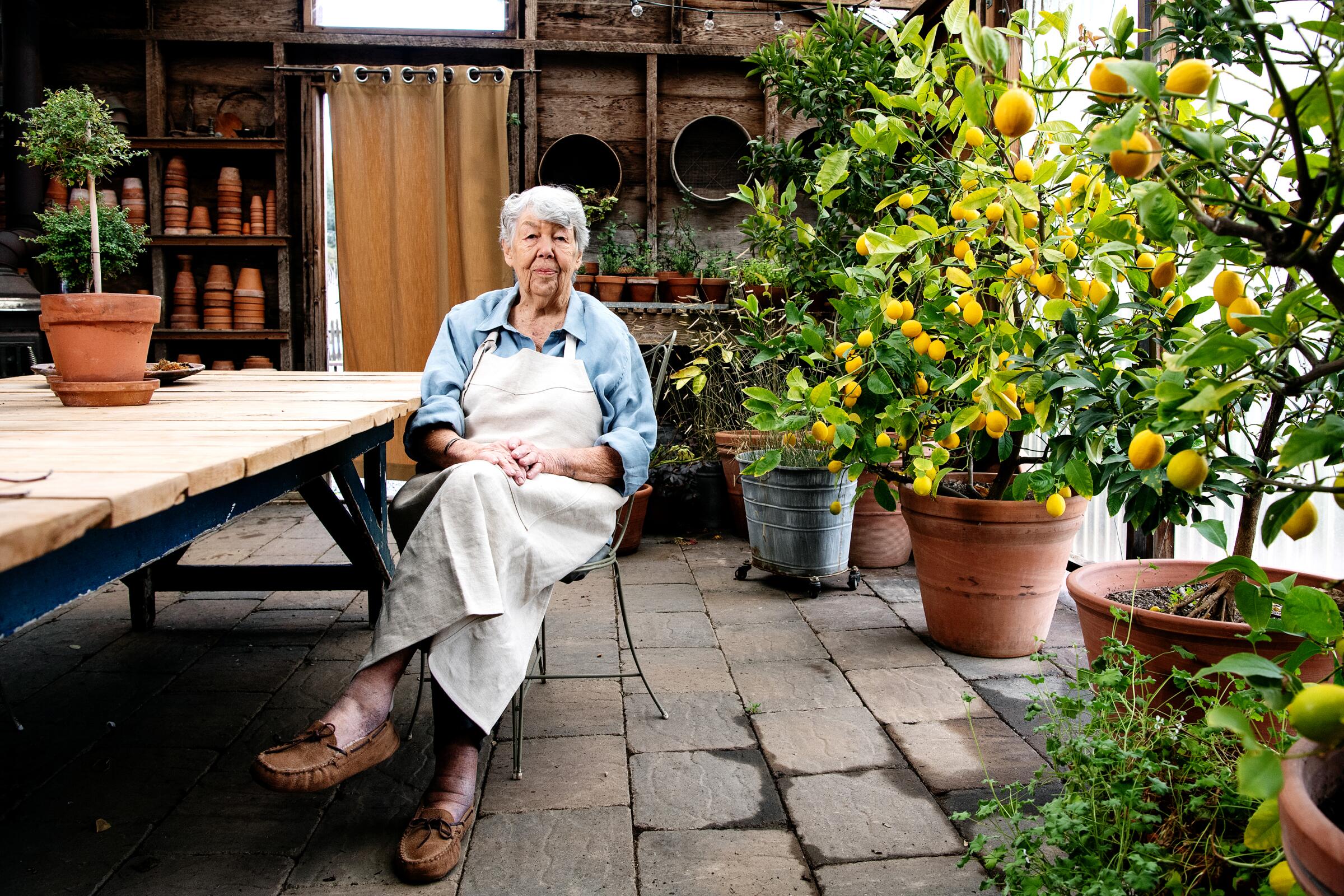
PHILO, Calif. — Chef Sally Schmitt remembers the French Laundry.
She remembers the clam spaghetti and blanquette de veau she served on opening night.
She remembers her late husband, Don Schmitt, opening bottles of wine, tending to the blaze in the fireplace and chatting with guests, an amiable host.
They are memories of her French Laundry. Not that French Laundry — the one you are almost certainly thinking of, the three-Michelin-starred restaurant helmed by renowned chef Thomas Keller.
The Schmitts opened the French Laundry in 1978 in a former Yountville, Calif., steam laundry originally built as a saloon, and ran it for 16 years.
“They opened this restaurant in a town that was kind of a backwater,” said Michael Bauer, who covered food and wine at the San Francisco Chronicle from 1986 to 2018. “She created quite a sensation ... it was pretty revolutionary.”
In the late 1970s, Napa Valley was shedding its identity as a rural outpost and embracing its potential as a high-end culinary destination, with the French Laundry front and center. The Schmitts, “along with Chez Panisse, probably shaped the whole Bay Area dining scene for decades” with unfussy food that, owing to their restaurant’s set-menu format, required diners to trust Sally’s French-inflected, California-influenced taste, Bauer said.
“I didn’t have a mission,” Sally said recently from her favorite armchair in her cozy living room when asked about the philosophy behind her cooking. “I wasn’t trying to prove anything to the world about simple, fresh, local food. It was just the way I cooked. I didn’t really have a statement to make. I just put food on the table.”
But it was a statement. Especially at the time.
Despite all of this, what happened after the restaurant changed hands in 1994 was on another level. Keller’s re-imagining of fine dining there was a revelation. Under Keller, the French Laundry, where the nine-course chef’s tasting menu costs $350, became a restaurant with global gravitational pull, a must-visit for food obsessives.
But there’s been an unintended byproduct of Keller’s outsize success at the restaurant: the minimizing of the Schmitts’ tenure there in the collective culinary consciousness.
And it’s not just well-heeled diners who’ve apparently forgotten: When Don Schmitt, who also had served as Yountville’s mayor, died in 2017, the many publications that once breathlessly covered his restaurant did not carry an obituary for him.
But in talking to Sally, 87, there’s a sense that this doesn’t weigh on her much. She is loath to assess her legacy, seeming almost pained by the attention, and said she doesn’t spend much time thinking about her former restaurant’s place in the culinary pantheon.

Sally Schmitt, the original chef and co-founder of the French Laundry, reflects on the history of the influential Yountville, Calif., restaurant.
Keller laments the notion that the Schmitts’ accomplishments have receded from mainstream memory, calling it “culturally sad.”
“It fascinates me that in modern society, with so much information available at a click, that there is this lack of incentive or lack of effort to learn about it today,” he said. “Don and Sally were very important people — not just in my life but also in the culinary revolution in America.”
Keller has worked to honor the Schmitts’ legacy. He recently moved the French Laundry’s official anniversary from the day on which he opened his version of the restaurant, July 6, to the date on which the Schmitts founded it, Feb. 9. Among other touches, he has painted the restaurant’s front door the same shade of blue that once graced the hood in Sally Schmitt’s kitchen there.
Now, Sally is doing her part too. She’s working on a cookbook that preserves the recipes from her French Laundry, and the memory of her time there with her husband.
::
Sally traced the arc of her career and told the story of how the French Laundry came into being while cooking in the kitchen of the Apple Farm, a 37-acre property she and Don moved to after selling the French Laundry. It runs up against the Navarro River in this Mendocino County town of 349 people. The farm feels hidden, tucked away amid forested hills that on this day were draped in low-lying clouds plump with rain.
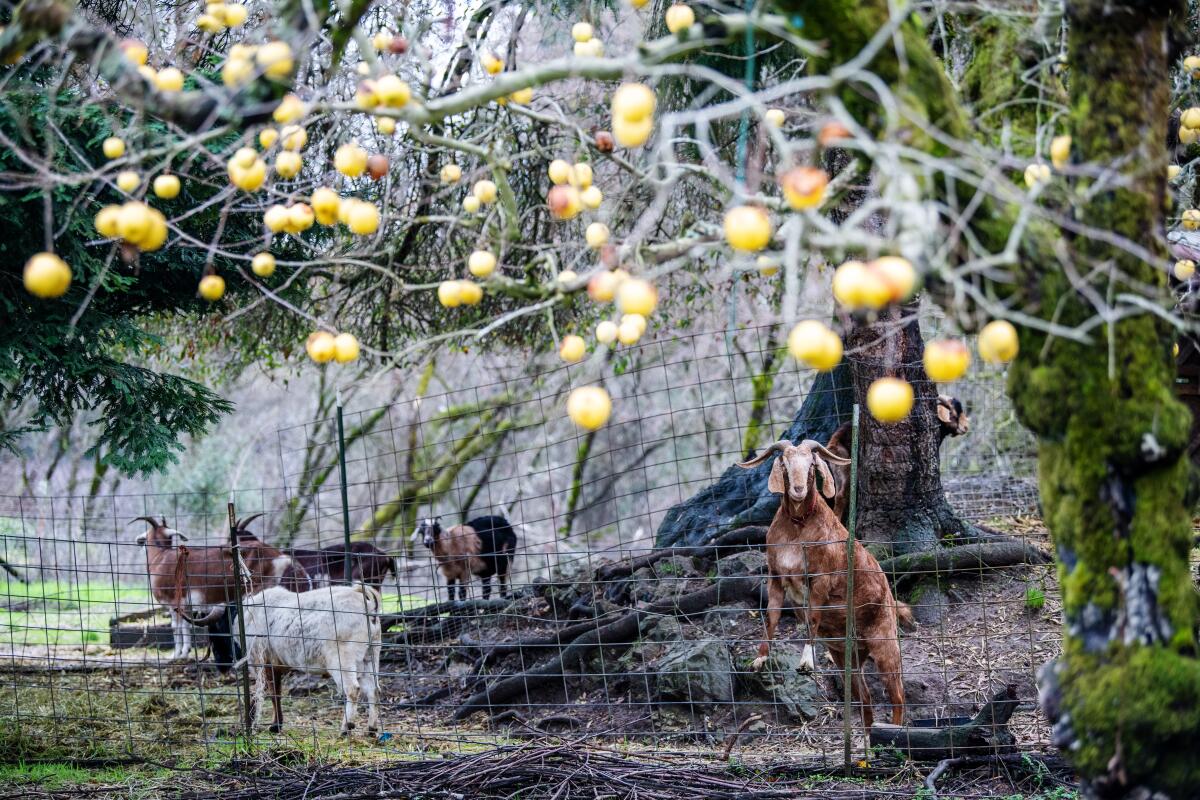
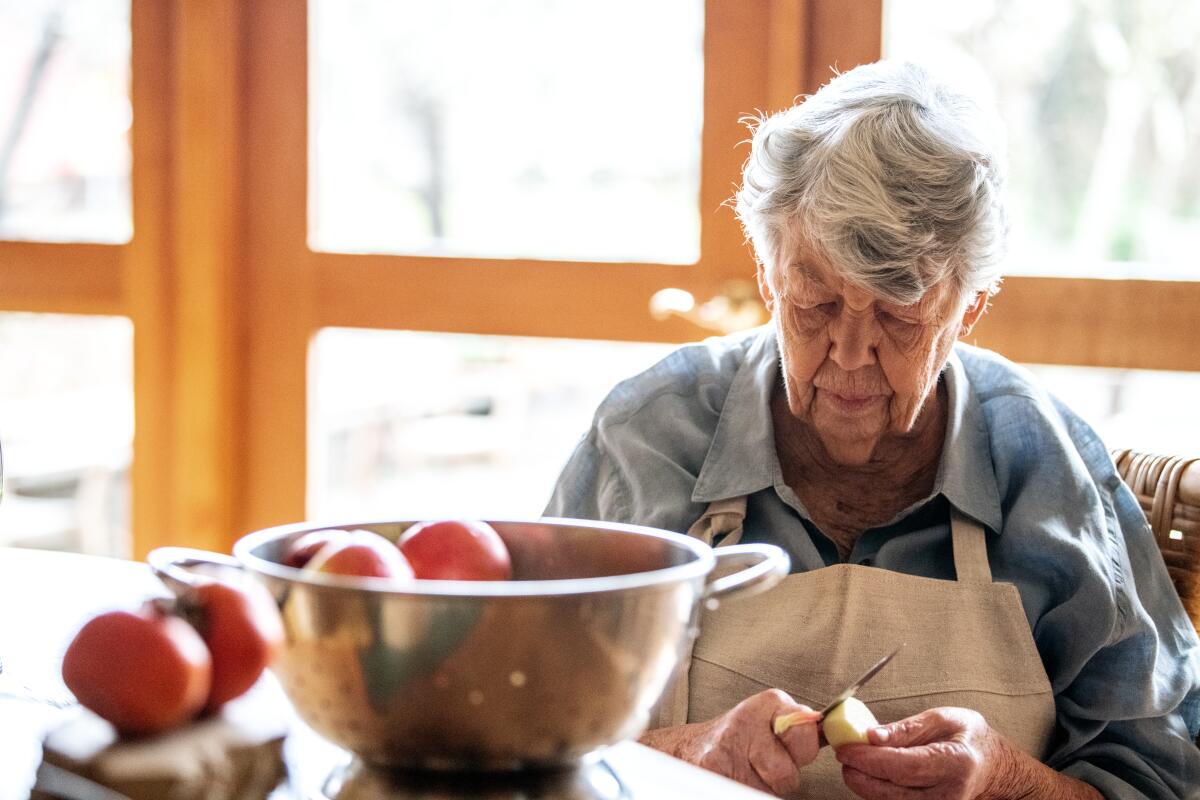
The Schmitts and their five children moved to Napa Valley in 1967 so that Don could develop a real estate project called Vintage 1870. The Yountville development included shops and restaurants, and allowed Sally to make the jump from home cook to chef. At Vintage 1870, the family operated Chutney Kitchen and Vintage Cafe, casual spots that grew increasingly popular.
A decade flew by. By 1978, the Schmitts were looking to open a new restaurant in a building they had purchased a few years earlier. It was a shabby former laundry, and it captivated them.
“All the walls are crooked and the stone is very rough at the base, but we simply fell in love with the building,” she said. “We didn’t want to gussy it up, and that fit our budget. We wanted it to be a place where our friends could come and eat comfortably.”
The restaurant’s opening — let alone its success — wasn’t a given. Money was tight, said daughter Karen Bates.
“My mom was a wreck,” she said. “My grandparents loaned my parents something like $30,000. We had to do it by the seat of our pants.”
But Sally said she sensed she was on the right track on opening night when winemaker Robert Mondavi burst into the kitchen after dinner.
“He kissed me on both cheeks and said, ‘How did you learn to make the clam spaghetti the real way?’” Sally recalled. “And I was just going, ‘Oh, my God!’ I thought, well, I guess I’m off to a good start.”
Her desire to make the restaurant feel like home led to some of the conventions that defined the French Laundry, such as one seating and a set menu per night. Guests were encouraged to stroll through the property’s garden, a tradition that continues today. Despite the relaxed tenor, there were rules. Smoking wasn’t allowed — and neither were salt shakers on the tables.
“I don’t like the salt sprinkled on top; I need it incorporated to give a good flavor,” Sally said.
That strict approach extended to the kitchen, according to grandson Perry Hoffman, who said he began working at the restaurant around age 5.
“I was always getting yelled at,” laughed Hoffman, 36, who in 2010 was the youngest American chef to earn a Michelin star as the chef of Étoile at Domaine Chandon in Yountville. “She was the boss and everyone knew it.”
The hard work paid off, and plaudits rolled in. The Times’ restaurant critic Lois Dwan wrote about the French Laundry in 1979, extolling the property’s “lovely oldness” and the seasonal, rustic cooking. The New York Times and other outlets also heaped praise on the restaurant, and Sally found herself on the cover of publications like Napa Valley Magazine. But the attention weighed on her.
“She hates having the spotlight on her,” Hoffman said. “It’s not easy.”
Before long, the farm, purchased by the Schmitts in the mid-1980s, beckoned.
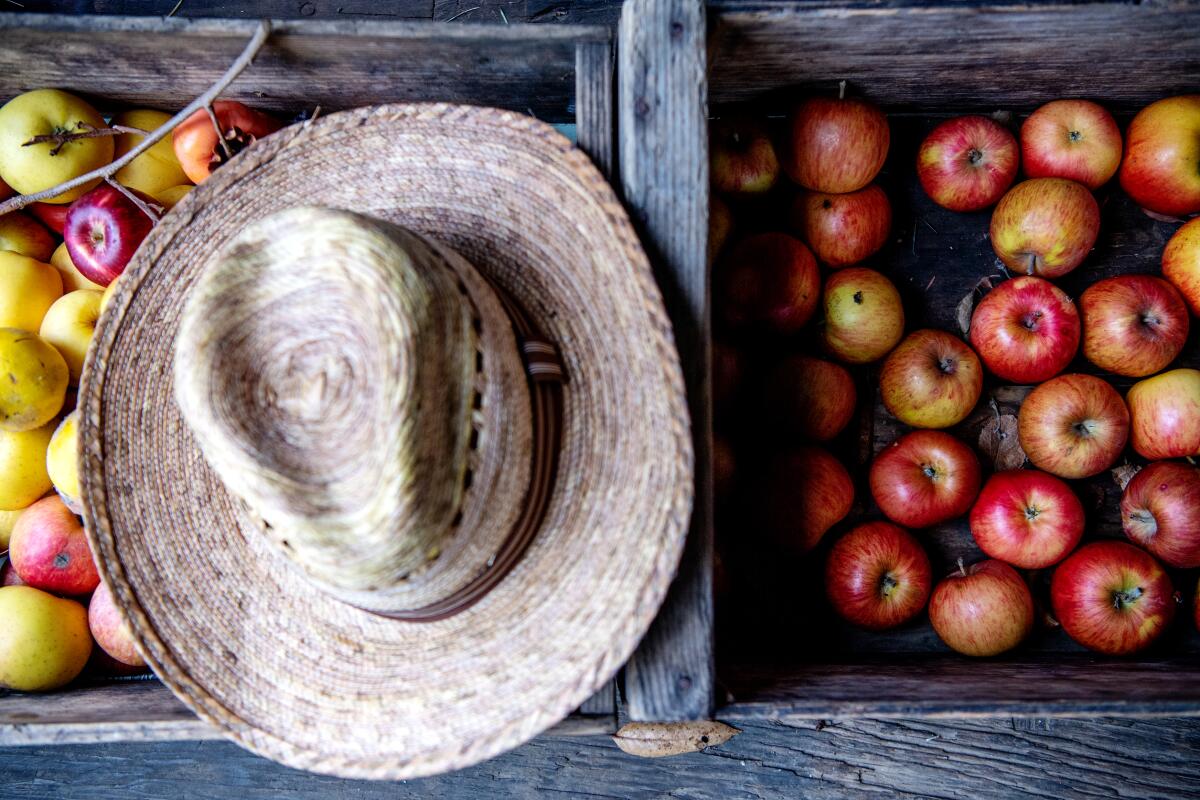
::
Just as Sally was angling to step away from the limelight, the modern restaurant business was coming into its own. The early 1990s minted a new class of celebrity chefs who got rich on cookware lines and TV shows. There had been famous chefs before, but the launch of the Food Network in 1993 made stardom — and all that comes with it — more readily attainable. She wasn’t interested.
“I was tired,” Sally said. “And Napa Valley was becoming a little chichi for us.”
Before leaving, she and Don had to find a buyer for the French Laundry — and it had to be the right one. Some prospective purchasers thought the space “was too small” and others said they “couldn’t do anything with it,” Sally said.
Then there were those who rubbed the Schmitts the wrong way. “This woman came from Florida who owned a string of restaurants,” Sally said. “We talked for a little while, and after she left, I remember sitting around the table with our crew, [and] everybody looked at me and said, ‘You’re not going to sell it to her!’”
Enter Keller. His friend Jonathan Waxman (a pioneering chef in his own right, who at that time was helming nearby Table 29) told him the French Laundry was for sale. Scoping it out, Keller “fell in love instantly,” he recalled. “We talked about price for 10 to 15 minutes and then it was my job to raise the money.”
That took a year and a half.
“They were extremely patient,” said Keller, who had earned acclaim for his cooking at Rakel in New York in the late 1980s and briefly served as executive chef at the Checkers Hotel in downtown L.A. before leaving that post in 1992. “I would tell them about my successes and failures, and most of the time those setbacks would interfere with their future plans, but they continued to support, opine and mentor.”
Sally said that she and her husband trusted Keller, even as his ambition complicated the process. “He shared with us a proposal for reeling in potential investors. Among other things was a list of equipment that he would need. Don and I just laughed,” she said. “We operated with a stove and a refrigerator and a mixer.”
But Keller closed the deal and opened his French Laundry in 1994. He didn’t change the name, he said, in part to honor the Schmitts’ accomplishments there.
Soon the Schmitts decamped to the Apple Farm, where Bates and her husband had already been living and overseeing the operation.
For 15 years or so, mother and daughter gave cooking classes at the working farm, side-by-side. They also opened a bed and breakfast to accommodate guests attending classes.
Sally settled into her new life and gave little thought to the one she left behind. “I don’t do anything except sit here and peel apples every once in a while,” she said.
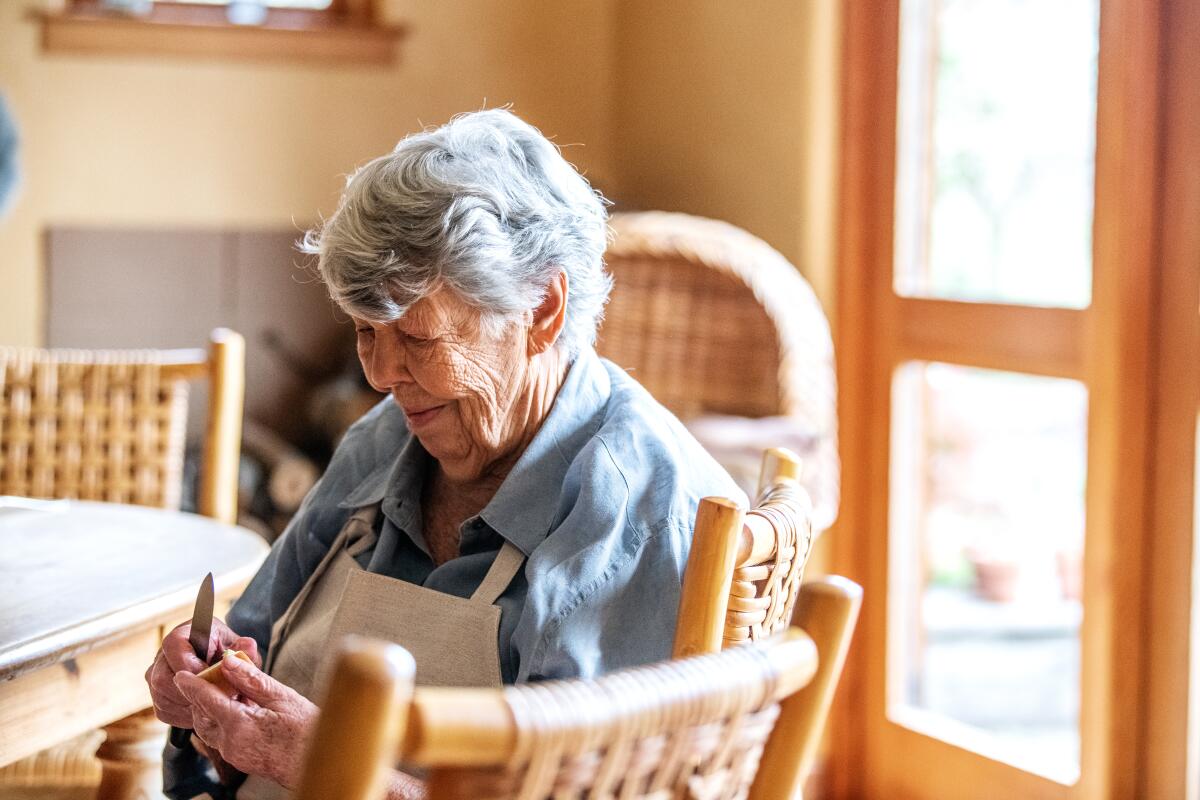
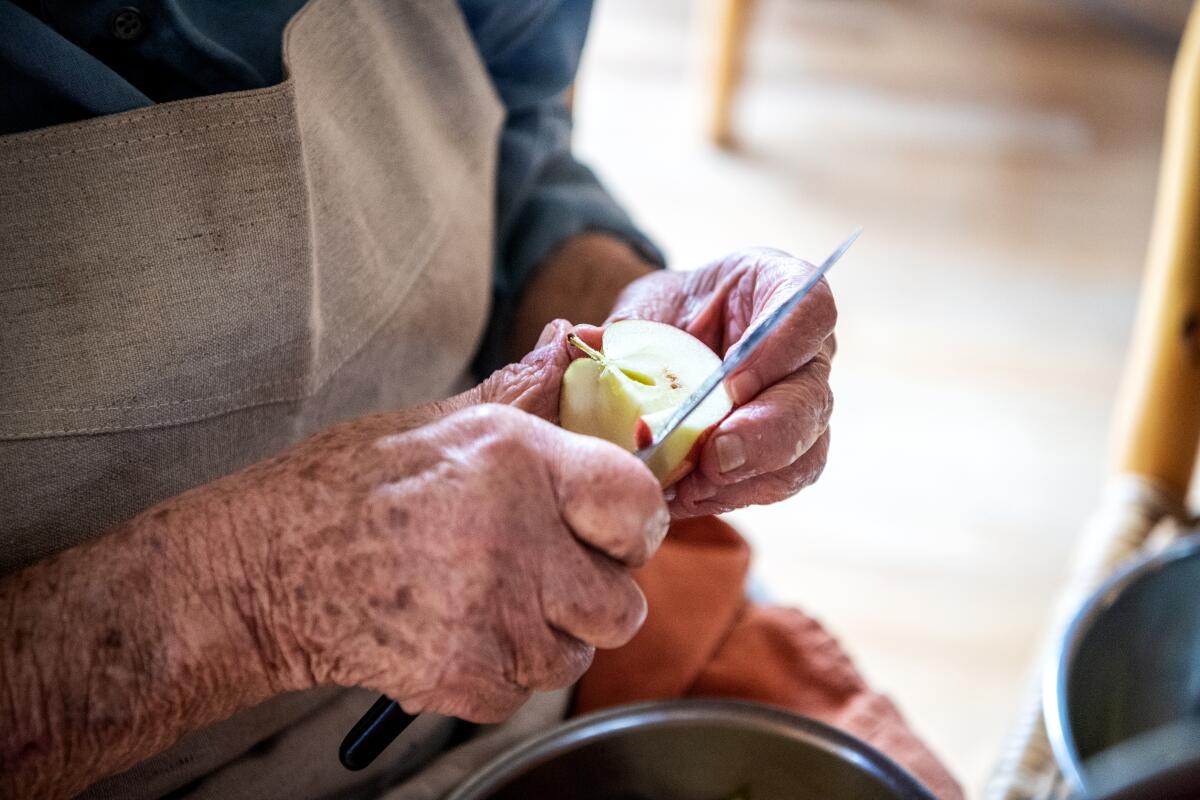
::
Still, the cookbook project has forced Sally to revisit some “old, old memories.”
“It is kind of like living my life over again,” she said.
Grandson Byron Hoffman, 38, said that during Sally’s 80th birthday party, he and other relatives announced that their gift to her would be a cookbook they would help create. Early on, it was only meant to be a memento for Schmitt and her family.
But Hoffman said he soon realized the book should be widely published, even if his grandmother was skeptical.
“I would say her predominant feeling, which still persists now, is not necessarily being convinced that it will still be relevant to the rest of the world,” said Hoffman, partner and creative director of Offset, a design and branding studio. “But I truly believe it is an important legacy.”
The French Laundry, a major part of that legacy, has been a blessing for Sally — but a yoke too. She is annoyed, for example, by reviews of Perry Hoffman’s restaurants that note his lineage.
“Finally, Perry is starting to get write-ups where they don’t mention that he is the grandson of Don and Sally Schmitt,” she said.
Sally admires what Keller has done with the French Laundry. But that doesn’t mean she loves visiting it. Asked about dining at the restaurant, which she has done a handful of times, she made clear it is a strange experience. The food is, of course, very different from what she once produced there. A visit for Don’s 70th birthday featured a 23-course meal. “You have to take notes to remember what you ate,” she said.
Perry, now the chef at the Restaurant at the Boonville Hotel, an inn near the Apple Farm that’s co-owned by one of Sally and Don’s sons, said he believes her complicated feelings about returning to the French Laundry stem from discomfort with the spotlight. When Sally has dined there, he said, she’s been treated like a star.
“If she went to the French Laundry, there is nothing more she’d like than to sit in the garden with Thomas and have a great conversation,” he said. “The food — she is going to love every bite, but to her the food is just so ‘uptown.’ That’s her word.”
For Keller, the French Laundry was the starting point of an empire that now includes a dozen other restaurants and bakeries in Yountville, New York, Las Vegas and Surfside, Fla. Sally, for her part, seemed unbothered by the notion that the French Laundry is now synonymous with him. “We sincerely hoped for his success, but we’d never dreamed of how huge a success he would be,” she said.
Still, others are troubled by the fading memory of her French Laundry.
“We don’t respect history in most regards,” Bauer said. “We are always after what’s the newest [thing].”
But it was evident that none of this bothers Sally much. She’s troubled by something else: the way Napa Valley has changed. She complained of its snarled traffic and pretension. It can be easy to see how she feels this way.
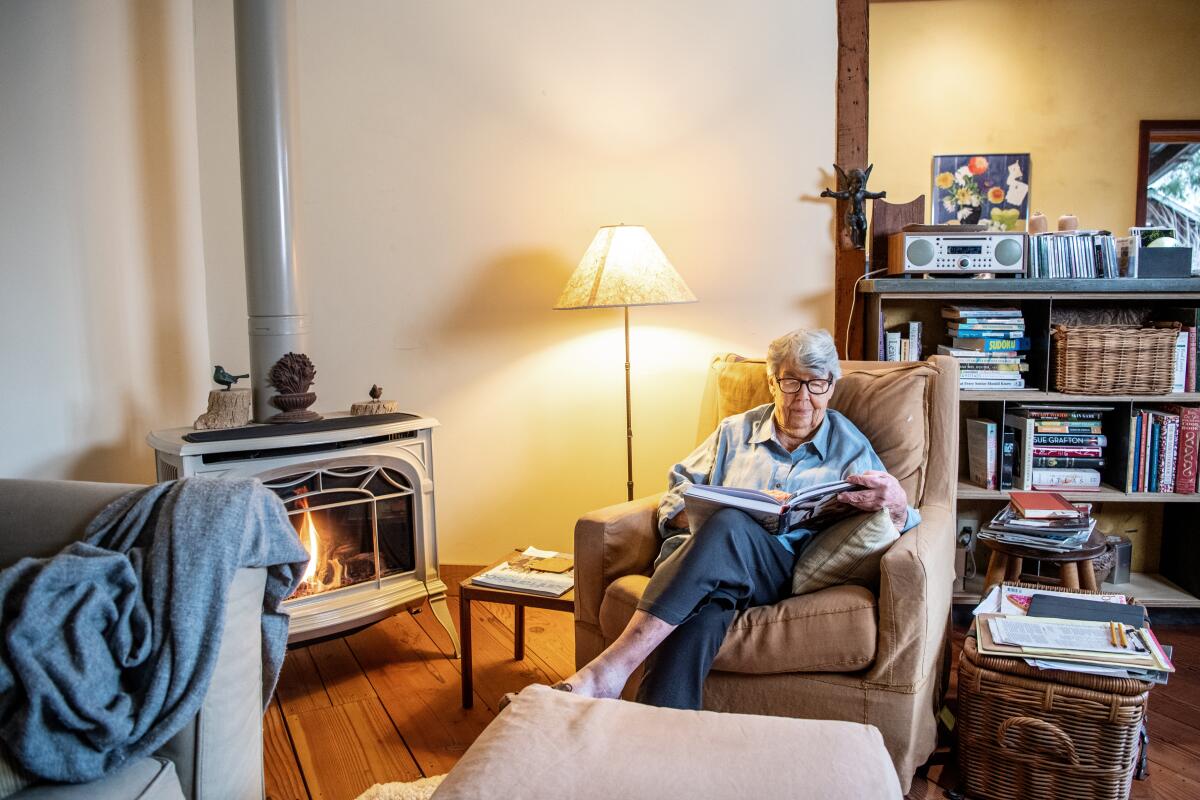
These days, Vintage 1870 has been rebranded V Marketplace. And on a recent visit between Christmas and New Year’s Day, when tourists stumbled across the valley from winery to winery, the development was thronged. In the parking lot, a canary yellow Ferrari 488 occupied a prime spot, and on the curb next to the $300,000-plus car was a wine glass smudged with lipstick and the dregs of what was probably an expensive cabernet.
“A part of me is kind of ashamed of having started the ball rolling,” Sally said. “I am a little sad about the extent to which it has grown. I wish it hadn’t happened.”
But the cookbook will capture a Napa Valley frozen in amber. It seems obvious that it will be a capstone on her career, something that will help preserve her legacy.
“It’s hard for me to realize that,” she said.
And in any case, there are more apples to peel.
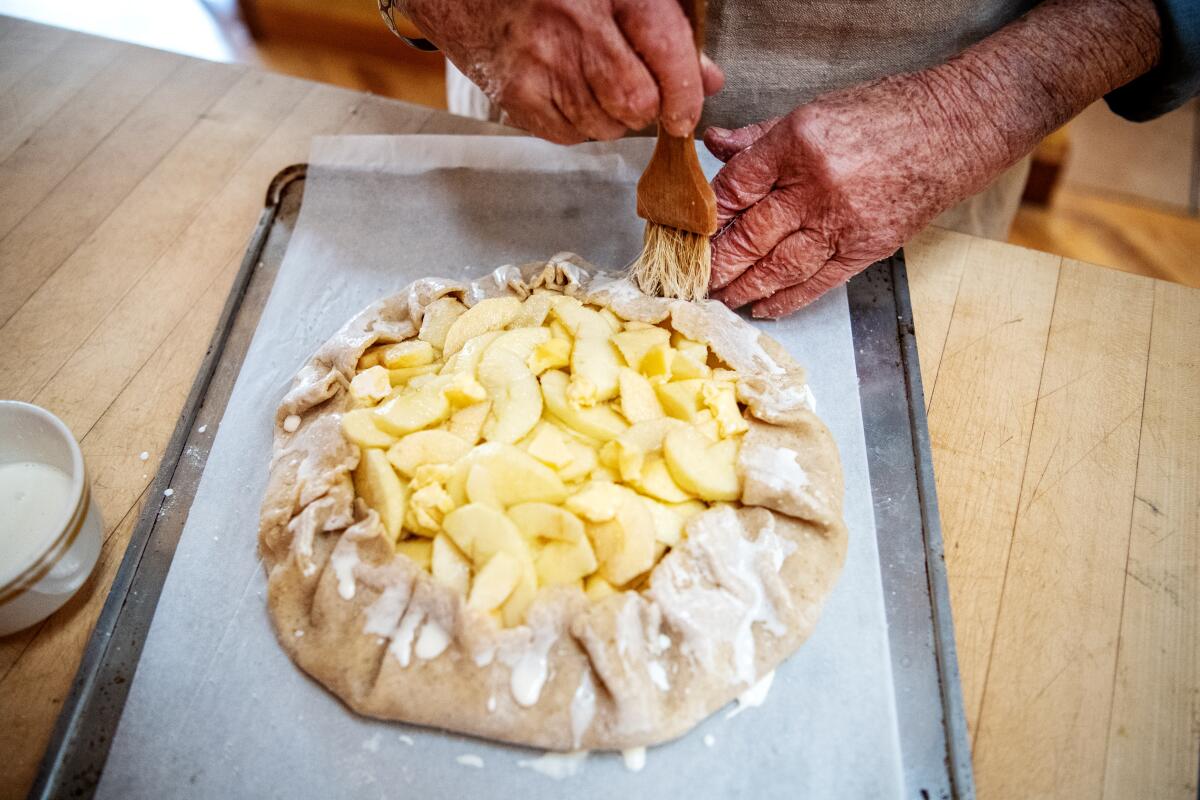
Eat your way across L.A.
Get our weekly Tasting Notes newsletter for reviews, news and more.
You may occasionally receive promotional content from the Los Angeles Times.